FEW nations, if any, match England when it comes to self criticism.

The 1-0 win over Serbia would have been cause for celebration for many, but instead it only seemed to raise further questions against the Three Lions’ credentials of winning Euro 2024.
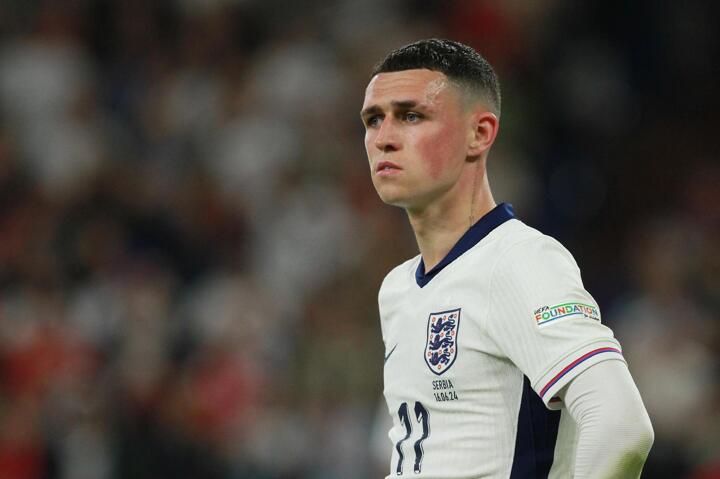

A dominant opening 25 minutes gave way to a sluggish affair that saw Gareth Southgate’s side struggle for control of the match and dangerously teeter towards conceding.
Jude Bellingham came out of the game widely lauded for his performance, but Trent Alexander-Arnold, Phil Foden and even captain Harry Kane came in for criticism from fans and media.
England face Denmark, who drew their opening group stage match 1-1 against Slovenia, in game two on Thursday at the Deutsche Bank Park in Frankfurt, live on BBC One at 5pm.
The Three Lions will come into the match looking to get six points out of six and secure a route into the knockout stages from Group C.
Denmark will not be easy opponents, and their 3-5-2 system with powerful and quick forward players in Jonas Wind and Rasmus Hojlund and the creativity of Christian Eriksen behind them will cause some problems.
In this preview though we will concentrate on the lessons that Southgate may have learned from England’s opening match against Serbia.


Do not panic about the Harry Kane role
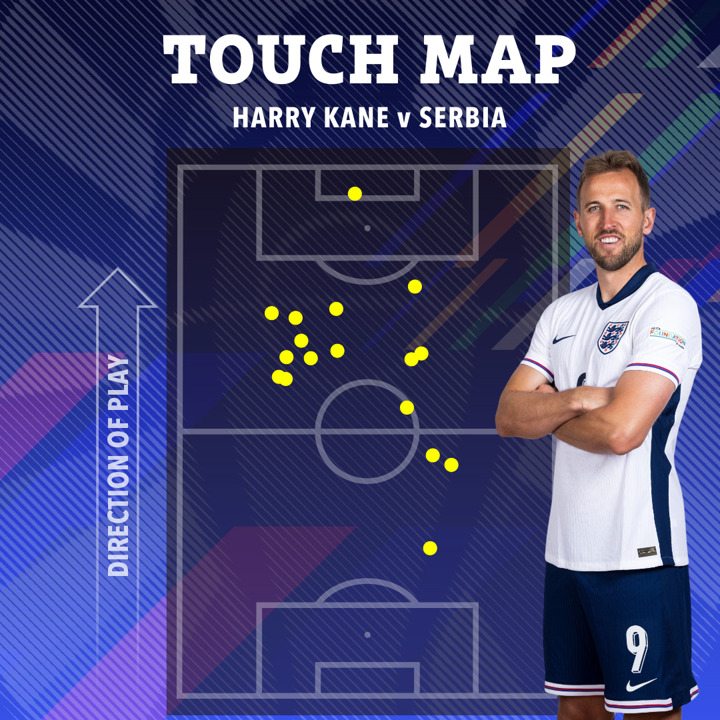
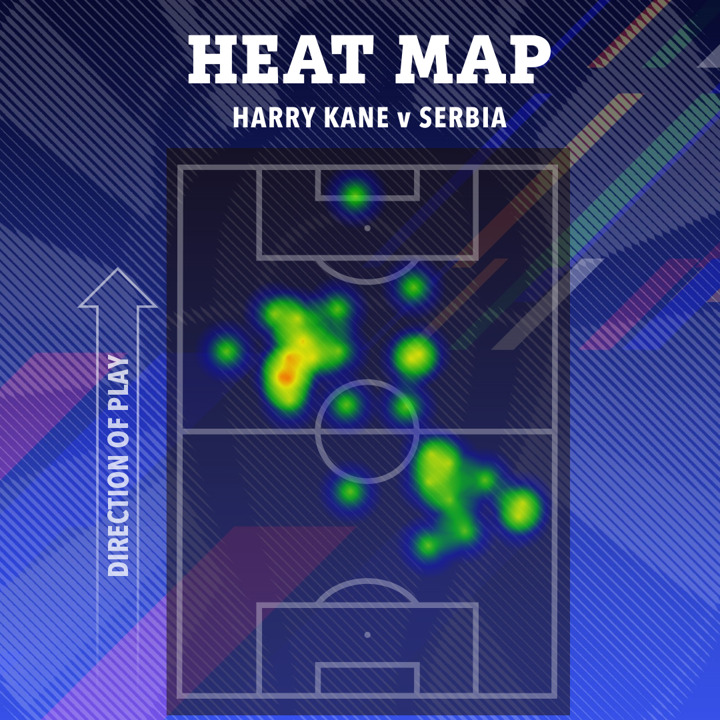
Despite the emergence of Bellingham as a superstar on the world stage, Kane remains the talisman for the English national team.
The 30-year-old comes into this tournament off the back of an incredible first season in German football with Bayern Munich where he netted 44 goals and 12 assists.
Despite the narrative surrounding the game that Kane barely touched the ball, he was in fact performing his role perfectly.
While previously we have seen Kane drop into deeper to link the play with the midfield, his role in this England team is different and he is being asked to remain high to pin opposition defenders deep.

This pinning of the opposition central defenders is intended to create space between their defence and their midfield that can be exploited by the likes of Bellingham and Foden.
In this setup we are seeing Kane play a very specific role, but the fact he is not looking to drop in to get the ball and play long-range passing does not mean that his performance has dropped off.
Indeed, his movement and positioning were effective against Serbia as he forced them to defend in a deeper line than they would have wanted to.
This created the space for the likes of Bellingham, Foden and Alexander-Arnold to occupy in the final third.

By pushing higher and maintaining this high position, we saw Kane create the platform for England’s more creative players to occupy and hurt the Serbians with their movement through the lines.
It is also worth bearing in mind that had Kane’s header in the 76th minute found the net and not been touched on to the crossbar then the narrative may have been very different.
Should Phil Foden start against Denmark?

Yes, yes he should. While it is fair to say Foden did not have his best match against Serbia we have to remember his outstanding performances for Manchester City last season.
While Foden may not be at his best when asked to play from the left in a rigid system, it is worth noting that he played a different role to Bukayo Saka played on the right wing.
While Sake stayed wide and looked to isolate defenders 1v1 on the wing, we saw Foden drift around the pitch in and out of pockets of space and not stay wide.
Part of the issues Foden had in the match was down to the fact that he was trying to come inside and occupy the same spaces that Bellingham was taking up in central spaces.

Foden wanted to receive in these areas, but having another player, like Bellingham, also spaced centrally meant that it was too crowded.
At Real Madrid, Bellingham often rotates outside to fill space on the left side of the attack as Vinicius Junior comes inside, but he typically stayed central in the final third against Serbia.
So, how do England and Southgate solve these issues to get the best out of Foden?
We believe adjusting the shape to have Bellingham starting from a deeper position, as the number 8 beside Declan Rice, and Foden then playing centrally as the 10 would be more effective in terms of finding the combinations and the angles to play through in the central areas.
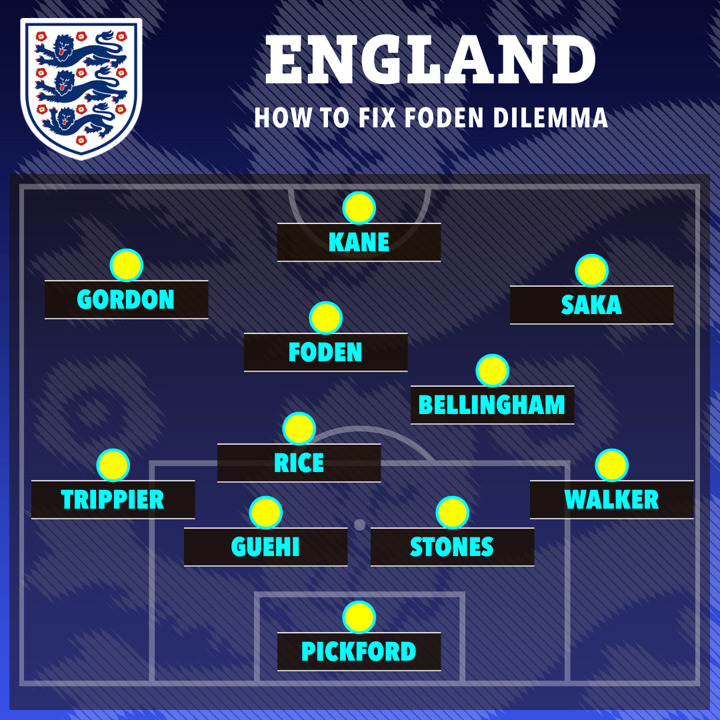
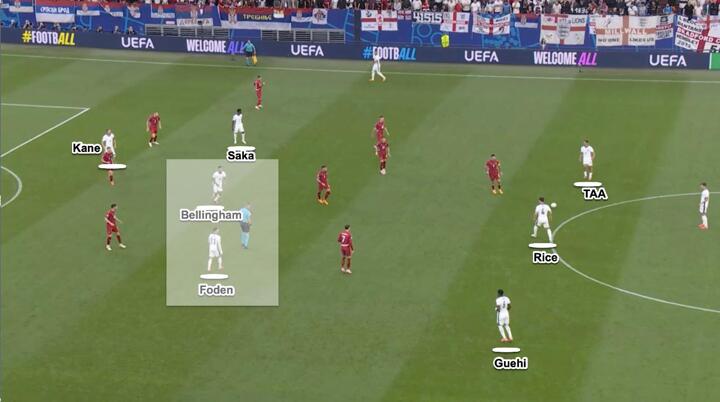
This would also allow Southgate to use a more direct winger on the left side to stretch the pitch and create space centrally for their best players.
If Foden does play on the left side against Denmark then he will have to stay slightly wider, at the very least in the channels, in order to find the space to play.
Have England solved their defensive problems?
While England came into the tournament with fans and pundits alike praising their attacking options, there was real concern about the squad from a defensive perspective.
While long-term Southgate favourite Harry Maguire was left out of the final squad there was a question mark as to who would start as the left-sided central defender in their back four?
In the end, Southgate decided to go with Crystal Palace star Marc Guehi, and the 23-year-old defender barely put a foot wrong.
In possession, he was safe and secure but also displayed the ability to progress the ball through the lines.


Defensively he was solid as he dealt with the threat of the dangerous Serbian forwards.
Juventus ace Dusan Vlahovic, in particular, looked to play on Guehi’s side of the pitch.
But we saw the defender play effectively whether he was defending tight or in space as he stopped Vlahovic from receiving the ball in dangerous positions.
And this was key in helping earn a clean sheet.
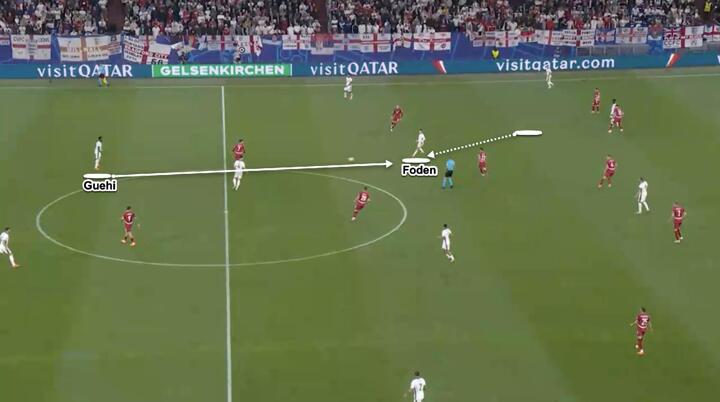
Keeping the partnership of John Stones and Guehi at the centre of the defence might be one of the keys for England if they are to be successful in this tournament.
Of course, different opponents will require different remedies.
Denmark will be dangerous opposition

Despite only coming out of their opening group stage game against Slovenia with one point, Denmark will still be difficult opposition for England.
Their strikers, Wind and Hojlund, are both over 6ft with pace and power and the ability to run in behind the defensive line.
They have experience and technical quality throughout their squad and they will have studied the Serbia match to understand the threat England pose.
The key for England will be in finding ways to apply pressure to the Danish build-up.
The likes of Foden, Saka and Bellingham will have to be ready to join Kane in pressing high against the three-man Danish backline to prevent them from building their attack.
Conclusion
At the end of the day, England are the only side in Group C to come through the opening round of fixtures with three points and they have put themselves in the driving seat to secure qualification.
Beating Denmark will see England through to the knockout stages, where the margins grow even finer.










